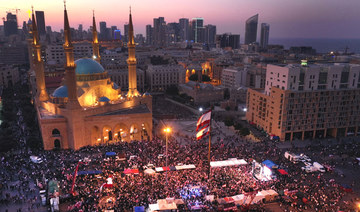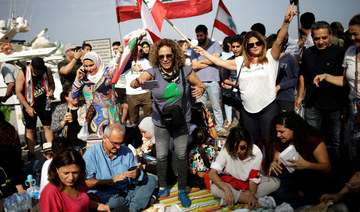BEIRUT: Protesters remained defiant Monday after supporters of Hezbollah and Amal attacked demonstrators overnight, sparking a UN call to keep protests peaceful.
Demonstrators demanding a complete government overhaul have stayed mobilized since protests began on Oct. 17, but a bitterly divided political class has yet to find a way forward.
Frustrated by the stalemate, protesters had called for road blocks and a general strike on Monday, but an attack by supporters of allied parties Hezbollah and Amal on Sunday night weakened the turnout.
Political parties “are trying to instill fear in us as a people, so we don’t progress and stay at home,” said Dany Ayyash, 21, who was blocking a key road in Beirut’s Hamra district.
But “the attack gave us all — at least the ones here right now — a sense of determination,” Ayyash said.
At around midnight on Sunday, backers of Hezbollah and Amal attacked demonstrators at a flyover near the capital’s main protest camp.
Brandishing party flags, they hurled stones at peaceful demonstrators and taunted them as riot police deployed to contain the violence.
The attackers also ravaged a nearby encampment, tearing down tents and damaging storefronts in their most serious assault on protesters so far.
At least 10 demonstrators were injured, civil defense said.
The UN Security Council called for all actors to maintain “the peaceful character of the protests by avoiding violence and respecting the right to peaceful assembly in protest.”
UN Special Coordinator for Lebanon Jan Kubis earlier called for restraint.
“I urge all Lebanese political forces to control their supporters, to avoid using the national protests for pursuing their political agenda,” he tweeted.
The state-run National News Agency said authorities have begun an investigation into the incident.
Parliament speaker Nabih Berri, who heads the Amal Movement, called on security forces to keep roads open to avoid “civil strife.”
On Monday morning, scattered stones, shattered glass and mangled tents littered the main Beirut protest camp at Martyrs’ Square. Nearby car windows had been smashed with rocks.
Security forces tried to disperse protesters in a neighboring Beirut district, and removed other demonstrator barricades deployed in the north and east of the country.
The army detained nine people north of Beirut at dawn after they tried to block roads, but freed them later, the military and the NNA said.
They also arrested four other “rioters,” releasing three shortly afterwards.
The security forces have come under fresh criticism following Sunday’s attack, with protesters accusing them of being lax with Hezbollah and Amal supporters, most of whom were allowed to walk away.
“The thugs throw stones and insult security forces but they don’t confront them,” said Elie, 24, who was among the protesters attacked.
“They don’t arrest them the way they arrest us.”
Such criticism prompted Interior Minister Raya Al-Hasan to say the army and police remain the only “guarantors of the country’s stability.”
Late Monday, hundreds of Hezbollah and Amal supporters rallied in the southern suburbs of the capital after a man and woman were killed in a car accident earlier Monday.
A video of the incident showed a car ramming at high speed into a metal barrier before catching on fire, in an incident both Shiite parties have blamed on a protester roadblock.
The demonstrators however denied any responsibility, publishing a map of their roadblocks on social media.
Political leaders have failed to select a new government nearly a month since Prime Minister Saad Hariri’s cabinet resigned under popular pressure.
President Michel Aoun, whose powers include initiating parliamentary consultations to appoint a new premier, said he was open to a government that would include technocrats and representatives of the popular movement — both key demands of the protesters.
But demonstrators say they reject any government that would also include representatives of established political parties.
The United States, France, the World Bank, and credit rating agencies have all urged officials to accelerate cabinet formation, warning of a deteriorating economic and political crisis.
In the latest diplomatic push, senior British foreign office official Richard Moore was in Lebanon Monday to meet top officials and “underline the urgent need to form a government,” the British embassy said.
“The people of Lebanon have been clear in their demand for improved governance, and they should be heard,” Moore was quoted as saying.
Lebanon protesters defiant despite Hezbollah attack
Lebanon protesters defiant despite Hezbollah attack
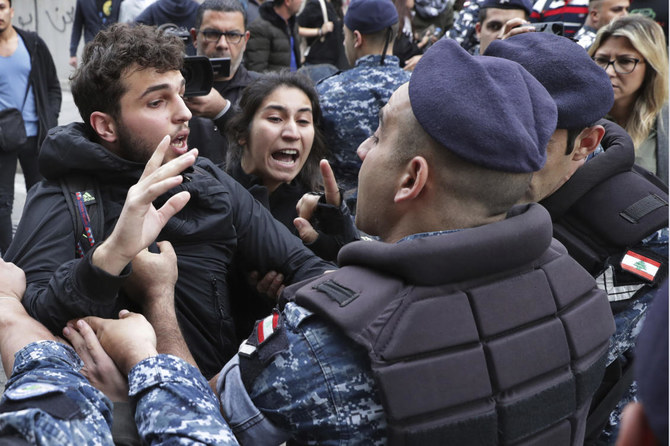
- Protesters called for road blocks and a general strike, but an attack by supporters of Hezbollah and Amal weakened the turnout
- Demonstrators demanding a complete government overhaul have stayed mobilized since protests began on Oct. 17
Saudi Rasan to offer 30% shares for IPO on Tadawul

RIYADH: Saudi-based fintech Rasan Information Technology Co. is set to offer 22.74 million shares for an initial public offering on the Kingdom’s main market.
The company, along with its subsidiaries, will list the shares, which represent 30 percent of its issued share capital, on Tadawul through the sale of 17.4 million existing ordinary shares as well as 5.3 million new ordinary shares, according to a statement.
While the existing ordinary shares account for 23 percent of the company’s issued share capital, the new ordinary shares represent 7 percent.
This comes following the Capital Market Authority’s approval in March of the fintech firm’s application for registering its share capital and offering the total number of ordinary shares, with a nominal value of SR1 ($0.27) per share.
Moreover, the offering proceeds after deducting IPO-related expenses will be distributed to the selling shareholders equally based on their shareholding in the existing ordinary shares.
The remaining proceeds are set to be distributed to the company in order to expand its current operations and products, market and develop new products, as well as finance the general purposes of the firm and its subsidiaries.
The final price of the offer shares, which account for the existing and new ordinary shares combined, will be determined by the existing shareholding and the company, in consultation with the financial advisers, following the book-building process and prior to commencement of the subscription period for individual subscribers.
The financial advisers include Saudi Fransi Capital and Morgan Stanley Saudi Arabia.
Saudi Aramco raises June’s Arab light crude price to Asia

RIYADH: Saudi Aramco raised June’s official selling price for the flagship Arab light crude it sells to Asia, according to an official statement.
Differentials for the flagship Arab Light grade were priced at Platts Dubai/DME Oman +$2.90 per barrel, up from +$2 a barrel in April.
This was the highest OSP in five months and largely in line with expectations, based on a firmer market structure and higher spot premiums last month for tradable Middle East grades such as Oman, Al Shaheen and Upper Zakum.
The higher OSPs also came after the Organization of the Petroleum Exporting Countries and its allies, known as OPEC+, maintained the first quarter round of voluntary cuts into the second quarter, while the global crunch on supplies of sour crude also underpinned Middle East grades.
Arab Medium was increased by $1 per barrel to +$2.35 per barrel, while Arab Heavy was hiked $1.10 a barrel to +$1.60 per barrel.
For Northwest Europe, the Arab Light OSP was set +$2.10 per barrel over ICE Brent futures, up from +$0.30/b while Medium was hiked from minus $0.40/b to +$1.10/b. Both grades were hiked to reflect the relative weakness in Brent compared to sour barrels.
Arab Light for April to the US Gulf was kept unchanged at +$4.75 per barrel over ASCI, while Medium was at +$5.45/b and Heavy at +$5.10/b, respectively, both slightly lower on the month.
Jordanian-Iraqi economic forum begins at Dead Sea resort

- A specialized session will focus on investment prospects in various economic sectors
AMMAN: Jordanian Minister of Investment Kholoud Saqqaf opened the Economic Forum for Financial, Industrial, and Commercial Partnerships between Iraq and Jordan on Sunday.
The forum, which is organized jointly by the Iraqi Business Council in collaboration with the Jordan and Amman chambers of industry, aims to strengthen economic ties between the two countries.
Held at the King Hussein Convention Center on the shores of the Dead Sea, the forum is the largest regional gathering for fostering economic cooperation between Jordan and Iraq, Jordan News Agency reported.
Over two days, the event will promote regional integration by facilitating economic connectivity and encourage collaboration across sectors.
Discussions will cover investment opportunities in Jordan and Iraq, prospects for commercial and industrial ventures, economic modernization initiatives, and opportunities in Jordan’s free and development zones.
Key figures attending include Kamel Dulaimi, the Iraq president’s chief of staff, ministers from Jordan and Iraq, as well as business leaders, investors and representatives from Arab and foreign companies.
Discussions are expected to focus on the banking sector’s role in providing financial support, while highlighting success stories from investment companies in both countries.
A specialized session will focus on investment prospects in various economic sectors, with a particular emphasis on mining and industry.
At the opening, Saqqaf highlighted investment prospects displayed on the Invest in Jordan platform, which align with the kingdom’s Economic Modernization Vision.
Meanwhile, Iraqi Minister of Industry and Mineral Resources Khaled Battal Al-Najm drew attention to his country’s industrial strategy and plans for a joint economic zone with Jordan, alongside efforts to address unemployment and attract foreign investment, especially in mining.
Dulaimi emphasized the significance of Iraqi President Abdul Latif Rashid’s recent visit to Jordan, underscoring discussions aimed at strengthening ties and enhancing economic systems to facilitate investment projects.
Hong Kong, Chinese investors set eyes on Saudi market
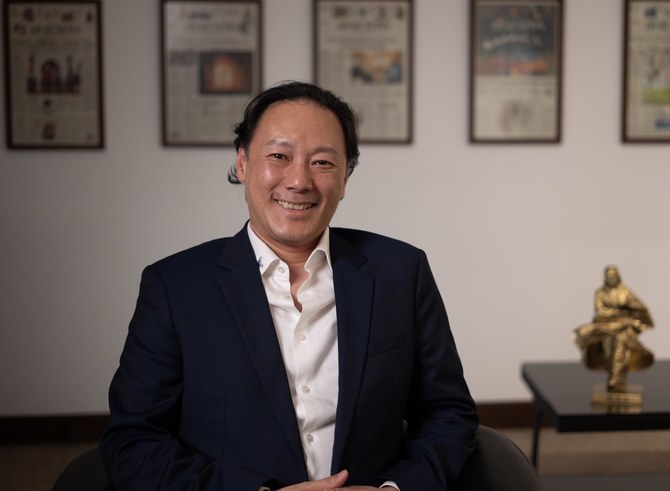
- A delegation of business leaders is set to explore diverse sectors in the Kingdom
RIYADH: Hong Kong and Chinese companies are gearing up for substantial investments in the Saudi market, marking a significant step toward strengthening economic ties, a top official said.
A delegation of 30 business leaders from Hong Kong and mainland China is set to explore diverse sectors in the Kingdom, propelled by the ambitious Vision 2030 outlined by Saudi leadership, King Leung, global head of financial services and fintech at Invest Hong Kong, said in an interview with Arab News.
Explaining the reason for his visit to Riyadh, Leung said: “I’m bringing a delegation of 30-plus executives across different disciplines to explore ways to do business in Saudi Arabia. This is not just about attracting inbound (investment), but also helping mainland Chinese companies use Hong Kong as a base to springboard to key markets like Saudi Arabia.”
Outlining the potential for co-investment between the two nations, he said: “Definitely, it’s going to be a huge number,” a sentiment that echoes the palpable excitement among Hong Kong investors who are eager to tap into the vast opportunities offered by the Saudi market.
The convergence of interests between Hong Kong and Saudi Arabia is underpinned by a notable synergy observed between businesses in both regions, the executive said, with an eye on forging strategic partnerships.
Hong Kong delegates, including private sector leaders and venture capitalists, are eager to explore avenues for collaboration that align with the objectives of Vision 2030.
“All these things that we are now finding out allow business leaders to see that some businesses from Hong Kong actually have very, very good synergy with Vision 2030 in your country.”
“It’s hard to quantify the exact number, but definitely, it’s going to be (a) huge number. I have to say these investments cut across different sectors, where you can imagine the market size is enormous,” he said, emphasizing the allure of megaprojects such as NEOM and the King Salman Park, which are set to transform the Saudi investment landscape.
These projects not only serve as magnets for investment but also catalyze growth in ancillary sectors such as financial services and consumer products, the head of financial services emphasized.
“These are megaprojects. So, all these things are going to really attract a lot of business activities, of course, initially in construction. But once you have all this construction coming in, then you need the other peripheral sectors to service them, like financial services, consumer products, and payments. So, all these things present a lot of opportunities that really get our delegates and investors from Hong Kong and China very excited,” he further explained.
Another testament to the nation’s favorable investment ecosystem is its “impressive GDP growth and low debt ratio,” factors that instill confidence among investors.
Among the sectors garnering attention are green energy and advanced manufacturing, the delegate said, affirming that Saudi Arabia is “paving the way for the future” of clean energy.
Hong Kong-based companies, armed with cutting-edge technologies, are eyeing opportunities to contribute to Saudi Arabia’s sustainable development goals.
“I understand that your country is also paving the way for the future, including adopting green energy now. So, one green energy company that I have been talking to in mainland China, they have been in the green hydrogen space for some time, and they are evaluating to put a green hydrogen factory in Saudi Arabia.”
Thus, projects such as the green hydrogen factory, poised to harness solar power for hydrogen production, exemplify this collaborative spirit.
“Now, of course, the reason why they’ve done that, part of it, is because the way they generate hydrogen is to use solar power. So they need to go to a place where this is something in abundance. Now, at the same time, you also have some highly visionary, highly capable investment vehicles from the PIF and other funds,” he noted.
Furthermore, the burgeoning fintech ecosystem in Saudi Arabia presents fertile ground for collaboration between Hong Kong and the Kingdom.
Fintech companies from Hong Kong are eager to leverage their expertise to enhance banking services and drive digital transformation initiatives in the Kingdom, the executive noted, adding, “In our delegation, we have roughly, I’ll say between 10 to a dozen or so fintech companies that are very keen to see if they can bring the business and set up in Saudi Arabia so that they’re able to service the banks here.”
On the opposite end, recognizing the potential for synergy, banks from Saudi Arabia are contemplating establishing a presence in Hong Kong to bolster their trade and financial services, he said.
This strategic move aims to capitalize on Hong Kong’s strategic position as a gateway to the Chinese market, thereby facilitating closer economic ties between Saudi Arabia and China.
“Of course, we would love to see some Saudi companies set up in Hong Kong. In fact, two of the significant meetings we had were with banks, and now these banks are interested in setting up a presence in Hong Kong,” the official said.
“This is because of the close trading relationships, and they would like to have a presence in Hong Kong to serve, for example, Chinese customers. This way, they can facilitate services like trade finance and various other services handled by the headquarters in Riyadh,” he added.
This comes after a pivotal moment in strengthening the economic ties between Hong Kong and Saudi Arabia, marked by the signing of a memorandum of understanding between Invest Hong Kong and the Ministry of Investment of Saudi Arabia last year.
As a result of this agreement, delegates from Hong Kong have been afforded unique insights into Saudi Arabia’s macroeconomic landscape, grand vision, and burgeoning investment opportunities, further fueling their enthusiasm for collaboration and investment in the Kingdom.
“Last year, our leader at Invest Hong Kong signed an MoU with MISA. That MoU brought us even closer together. They have been very kind to bring in leaders from different aspects to educate us about your country, from macroeconomic data to the grand vision from leaders in both the public and private sectors,” he said.
Leung said they also shared insights into projects that have already gained significant traction. “All in all, our delegation was super impressed by the progress made by the country,” he concluded.
UAE delivers 400 tonnes of food aid to Gaza
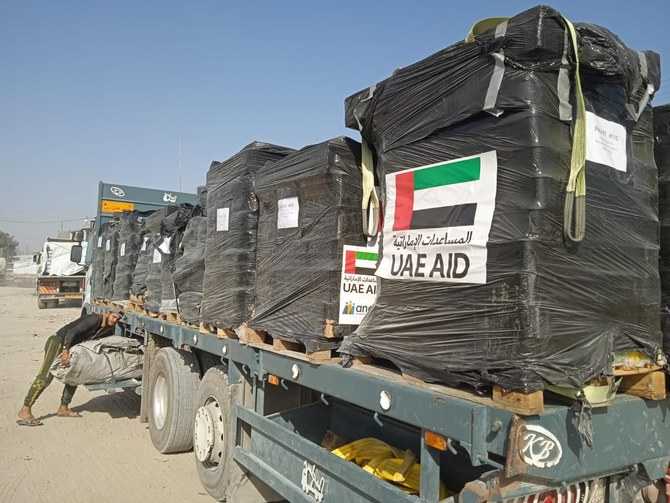
- Delivery, specifically for the northern areas of the enclave, is enough to feed about 120,000 people
DUBAI: The UAE, in partnership with American Near East Refugee Aid, announced on Sunday that it had delivered 400 tonnes of food aid to Gaza.
The delivery, specifically for the northern areas of the enclave, is enough to feed about 120,000 people, Emirates News Agency reported.
Reem Al-Hashimy, Emirati minister of state for international cooperation, said: “The UAE’s safe and successful delivery and distribution of food relief to the Gaza Strip, especially the northern Gaza Strip, marks a significant scaling up in action.”
She continued: “We remain firmly committed to our position of solidarity with the brotherly Palestinian people and alleviating suffering in the Gaza Strip. The UAE, working in parallel with international partners, is determined more than ever to intensify all efforts to ensure that aid lifelines get to those who need it the most.”
Sean Carroll, CEO of ANERA, thanked the Emirati government for its assistance in getting the much-needed aid to the Palestinian people.
“ANERA and the people we serve are extremely grateful for support from the government and people of the UAE, that allows us to deliver this food to northern Gaza, where the needs are so great,” he said.
Last month the UAE allocated $15 million under Cyprus’s Amalthea Fund to bolster aid efforts in Gaza.
Meanwhile, the Gulf country continues to collaborate with international partners and organizations to enable the effective delivery of food and relief via land, air and sea.
To date, the UAE has dispatched more than 31,000 tonnes of humanitarian supplies, including food, relief items and medical supplies, using 256 flights, 46 airdrops, 1,231 trucks, and six ships.
The UAE has embarked on several sustainable relief projects to ensure a consistent supply of food and water to the people of Gaza.
These initiatives include the establishment of five automatic bakeries, the provision of flour to eight existing bakeries, and the installation of six desalination plants with a combined capacity of 1.2 million gallons of water a day.



